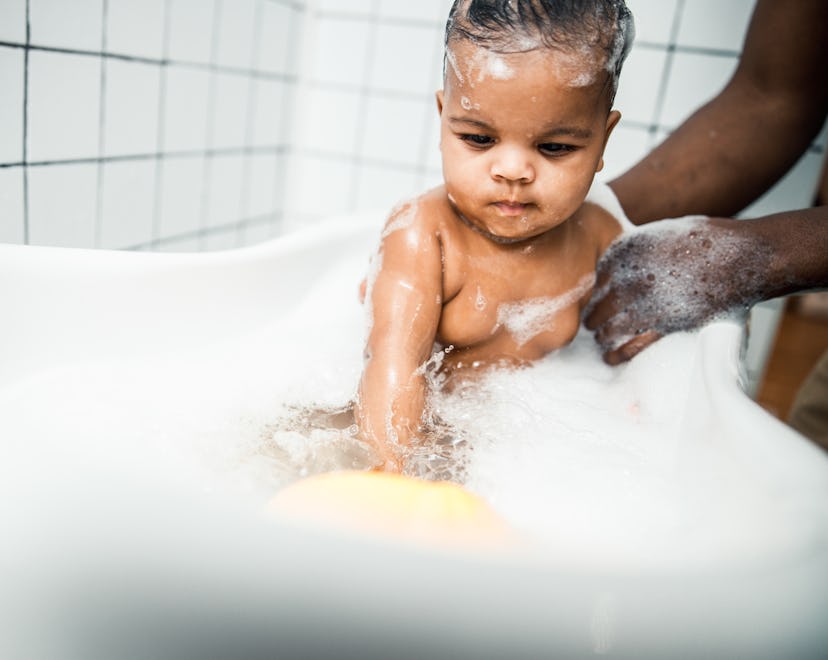Baby

Why Babies Love Water, According To Experts
There's something familiar about it.
If a baby is in or near water, splashing of some sort is bound to happen. Babies love water. They can’t wait to see all the splashing chaos their chubby fingers can cause, and the giggles that follow are some of the happiest sounds they can make. Babies really like water and playing in it tends to be one of their favorite things and an obsession that starts very early.
Not only will they make bath time look like a wave pool (pro tip: bring extra towels into the bathroom), but the same aquatic fascination happens with water in a cup. One day you’ll find them beating their upside-down sippy cup on their highchair tray just to watch the tiny droplets ease out so they can slosh their tiny hands in it. You might also find that they will thoroughly enjoy playing with ice in a water bin and in any body of water, from splash pads to rain puddles.
Why do babies like water?
“Water play presents a rich sensational experience for babies,” pediatrician Dr. Gary Kirkilas, D.O. tells Romper. The dynamics of water appeal to babies because during the first year of life, they are informational sponges. This includes how it sounds, how it feels on their skin, and how light reflects off of it. And the biggest kicker is that with all the newness they are experiencing, water is the one thing that is largely familiar. “Babies spent nine months in amniotic fluid, so while water is new, it’s also a familiar and soothing environment to them.”
The benefits of playing with water
Interacting with water is a great foundation for babies and toddlers to learn problem-solving skills. It also exposes them to the basics of science and math.
“Water can be a tool of sensory play and children can explore its properties with all five senses,” says developmental-behavioral pediatric specialist Dr. Fadiyla Dopwell, M.D.
“They can see the color change by adding food coloring,” Dopwell continues. “They can hear it splash. They can smell and taste it. They can feel the water with their hands or on their body as they dance in sprays from a hose or sprinkler. Parents can show their children how water changes its shape based on the container.”
Taking baths is a great time to hone in on those developing skills. But don’t be surprised if your infant doesn’t immediately take to it. “A few infants need to adjust to the feel and temperature of the bathwater. As a parent, each child had a different response to bath time,” says Dopwell.
The remedy for any apprehension, according to Kirkilas, is within the comforting presence of their parents where they feel safe enough to explore the different things they can do with water.
Here’s how you can play along and encourage development
Add toys to their bath
Kirkilas says they can use squeeze bottles and funnels to learn about cause and effect. “Repeatedly filling those squeeze bottles and funnels provides babies with an opportunity to recognize patterns.”
Provide floating and sinking objects
These are “great ways to practice fine and gross motor skills, as children will be drawn to pick them up,” Kirkilas says.
Don’t force it
As a mother, Dopwell has experienced differing reactions to water between her oldest and youngest children; one found it calming and the other had a screaming reaction every time. She encourages parents to be patient.
Kirkilas says parents should “start off slowly with small amounts of water; one to two inches of water is enough. Make sure the goal is having fun. Introducing new toys during bath time can help the process.”
Always supervise
“Babies should constantly be supervised around any body of water; this includes bath time,” says Kirkilas.
It only takes a few quick seconds for danger to occur which makes water safety very important. So never take your eyes off your little ones when they are near or in water. “Use touch supervision where a parent’s hand is constantly on the baby for the duration of the bath.” As an added safety measure, Kirkilas says to have a towel and other bathing supplies already prepped to avoid having to step away and also avoid bathing seats as they can tip over.
Children can sometimes develop a fear of water, which can play out in them being afraid to swim in a pool or get in the ocean, or just really hate baths. But if you take every chance to let them fully dive into their obsession with water play early on, maybe that love will continue — keeping them far above ever fearing it.
So bring on the buckets, puddles, and fun things that float. You’ll likely find yourself enjoying playing with and in water just as much as your baby.
Experts:
Dr. Fadiyla Dopwell, M.D., developmental-behavioral pediatric specialist at Developmental Pediatric Services in Dallas, Texas
Dr. Gary Kirkilas, D.O., pediatrician at Phoenix Children’s Hospital in Phoenix, Arizona